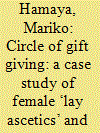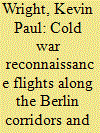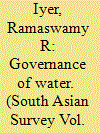|
|
|
Sort Order |
|
|
|
Items / Page
|
|
|
|
|
|
|
| Srl | Item |
| 1 |
ID:
158941


|
|
|
|
|
| Summary/Abstract |
This article investigates everyday practices of begging among female ‘lay ascetics’ in Haridwar, North India. The subject of female asceticism or renunciation in Hinduism has been far less examined than that of male renunciation. Recent feminist-conscious studies have pointed out that female ascetics are generally marginalized within, or completely excluded from, male-dominated ascetic communities, albeit some charismatic female gurus do manage to establish a measure of authority. But gender-based inequality is not the only form of inequality that matters here. This article explores the lives of female ‘lay ascetics’ who are regarded as neither authentic renouncers nor ordinary householders. While male ascetics are prioritized in receiving alms, most female ascetics must struggle to obtain alms through making use of their social networks. Female ascetics cooperate with each other in this for both their mutual advantage and for spiritual reasons. Yet serious competition over alms can and does arise, which can generate moral dilemmas and severe conflict. Through ethnographic descriptions of their gift exchanges, this article will clarify how female ascetics form social networks which are neither completely obligatory nor completely free.
|
|
|
|
|
|
|
|
|
|
|
|
|
|
|
|
| 2 |
ID:
140491


|
|
|
|
|
| Summary/Abstract |
During the Cold War, Soviet and East German military units, equipment and activities around Berlin were high priority targets for Western military intelligence agencies. This article examines the imagery gathering undertaken by British, French and US reconnaissance flights along the Berlin Air Corridors and inside the Berlin Control Zone. The quantity of information was effectively multiplied because of the close cooperation between the Western allies and coordination with Allied Military Liaison Mission ‘ground tours’. This cooperation generally went further than has been publicly acknowledged by individual governments. This paper contends that the collaboration provided the most comprehensive and regular collection of imagery on Soviet and East German military units for the duration of the Cold War. It contributed to a multi-dimensional picture of Soviet and German Democratic Republic capabilities and intentions. Soviet motives for generally not interfering with those missions on a regular basis are considered.
|
|
|
|
|
|
|
|
|
|
|
|
|
|
|
|
| 3 |
ID:
162325


|
|
|
|
|
| Summary/Abstract |
Both multi-person households and dense urban areas reduce per capita carbon dioxide (CO2) emissions by enabling people to share carbon-intensive goods within and between households. In this paper we estimate these household and urban economies in CO2 emissions using detailed household expenditure data for the United States. We then decompose these economies into their primary sources and investigate any potential rebound effects, or diseconomies. The results show that the bulk of household and urban economies come from reductions in emissions from residential energy use and private vehicle transportation. We also find some evidence of rebound effects, with both residential density and multi-person households increasing expenditures on air travel and restaurant meals in particular. These effects are small in comparison to the size of total net economies, suggesting that fears of large rebound effects or backfire effects may be overstated. These results further suggest that policies targeted at the provision of social and technological infrastructure, such as public transportation, mixed-use zoning, and public internet may be most effective in reducing the rural-urban divide in private vehicle emissions.
|
|
|
|
|
|
|
|
|
|
|
|
|
|
|
|
| 4 |
ID:
099617


|
|
|
|
|
| Publication |
2010.
|
| Summary/Abstract |
The term 'water governance' encompasses a wide range of issues of water policy, management, sharing, rights, conflicts, social justice and equity, conservation, sustainability and so on; and almost all of them involve legal questions. This article provides a broad overview, both explanatory and prescriptive, of some of the legal issues relating to water. These will include the question of ownership of water; the relationship between the state and civil society; the doctrine of public trust; the distinction between the right to water (that is, water as life-support) and water rights (use rights such as for agriculture, industry, etc.); water-related disputes of all kinds (including river water disputes) and the principles, entitlements, relative priorities and institutional arrangements needed for avoiding or resolving them; water markets and the question of privatisation of water; the regulation of water use in the interest of equity, social justice, harmony and sustainability and so on.
|
|
|
|
|
|
|
|
|
|
|
|
|
|
|
|
| 5 |
ID:
124526


|
|
|
|
|
| Publication |
2013.
|
| Summary/Abstract |
In a general and economical view, this article analyzes methods and mechanisms for the pooling and sharing of military forces and weapons inside the European Union (EU) in times of scarcity. Pooling and sharing could improve the EU military capabilities significantly if differences in location factors were taken into account and all states would focus on their respective strengths. More competition and less concentration are the keys to ensuring guaranteed access to military assets. Pooling and sharing are likely to be successful only if large states enhance their emphasis on collective defense by mutual aid and self-help, and reduce particularistic and parochial interests of local gain. The realm of personnel has the most potential for improvement but any change is likely to generate policy implications.
|
|
|
|
|
|
|
|
|
|
|
|
|
|
|
|
|
|
|
|
|